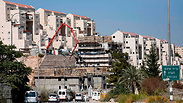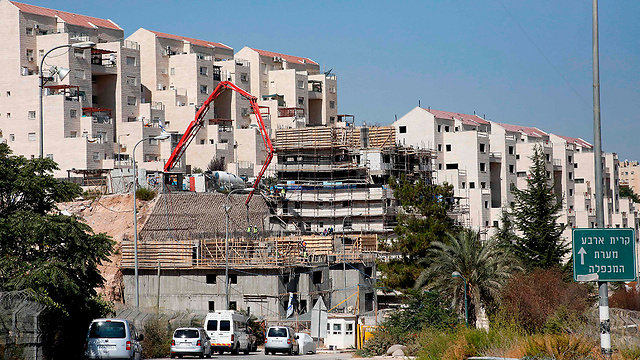

EU, UN members call on Israel to stop plans for new West Bank settlements
As Israel approves further construction in West Bank, the EU reiterates its objection to the 'illegal' settlements—warning such activity hurts future peace talks with Palestinians; meanwhile, Permanent Observer of Palestine to UN rebukes Def. Min. Lieberman for pro-settlement stance, adding that Israeli goverment 'opposes peace, disregards international law.'
Israel must halt new building plans for settler homes in the West Bank, the European Union’s Foreign Service said in a statement on Wednesday, warning that such settlements threaten any future peace deal with the Palestinians.
"The European Union has requested clarifications from Israeli authorities and conveyed the expectation that they reconsider these decisions, which are detrimental to on-going efforts towards meaningful peace talks," the statement said.
"All settlement activity is illegal under international law, and it undermines the viability of the two-state solution and the prospect for a lasting peace."
Earlier on Wednesday, Defense Minister Avigdor Lieberman claimed that the Israeli government is "working at a pace not seen since 2000" to further approve construction in the territories. Lieberman's statements were made during a press conference announcing the approved construction of the settlement.
In response, Riyad Mansour, the Permanent Observer of Palestine to the United Nations, rebuked Lieberman and the Israeli coalition during a UN Security Council meeting on Wednesday, claiming they "disregard international law" and are entirely disinterested in peace.
"You have to know that they not only say what they mean, they also do exactly what they say," Mansour said after quoting Lieberman's statement.
"Minister Lieberman and the rest of his coalition oppose peace, disregard international law and make the two-state solution impossible," he added, wondering aloud why "when Israel repeatedly proves its bad intentions, the international community continues to give it the benefit of the doubt."
The EU maintains that the lands Israel has "occupied" since the Six-Day War—including the West Bank, east Jerusalem and the Golan Heights—are not part of the internationally recognized borders of Israel.
In the past two days, several construction plans have been approved in the territories: construction of 31 housing units in Hebron, 36 units in the Rehelim settlement, 17 units in Nativ Ha'avot in Gush Etzion, 10 units in Har Adar, 44 units in Kfar Etzion, 129 units in Avnei Hefetz in Samaria, 59 in Negohot in the South Hebron Hills and 27 units in the Jordan Valley.
In addition, a plan for the establishment of the settlement of Amichai, 102 housing units intended for evacuees of the Amona settlement, was approved Wednesday by the Civil Administration's Supreme Planning Committee.
Two weeks ago, the construction of the settlement was halted due to the refusal of the legal advisor of the Interior Ministry to grant an exemption from tender to the Binyamin Council.
In response to the approval, Avichai Boaron, one of Amona's leaders, said that this was "a historic moment."
On Tuesday, the Supreme Planning Committee approved the marketing of 300 residential units in the Beit El settlement, which has not seen residential construction for the past decade.
Beit El Mayor Shay Alon said the European Union is in no place to make accusations.
"The European Union is the last body that can preach morality to us and tell us where and when to build," he stated. "After all, it is a body that violates the law every day. It places illegal structures in the Ma'aleh Adumim area for the Bedouin population.
"The entire State of Israel exists is in the same places that our forefathers lived in thousands of years ago. In Beit El we found the site of Jacob's dream, which is unequivocal proof that we are the 'landlords' here.
"We are here because we have returned home. We will continue to build, in Beit El and everywhere else in Judea and Samaria."

















